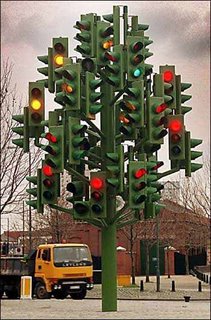
Here follows the passage (The Parable of the Weeds, also commonly known as the Parable of the Wheat and the Tares) that immediatly came to mind this morning when speaking to a friend about her frustrations with Christian believers who think they can distinguish clearly between who is (and who isn't) "saved". I take this seriously as one who recently, and somewhat rediculoutsly claimed that both Miles Davis and Serge Gainsbourg are now eternal residents of: "H" - "E" - "Double-Hockey-Sticks". Anyway, I offer a few reflections after the text itself. --JAZ
(Matthew 13:24-30)---
24 Jesus told them another parable:
The kingdom of heaven is like a man who sowed good seed in his field. 25 But while everyone was sleeping, his enemy cam and sowed weeds among the wheat, and went away. 26 When the wheat sprouted and formed ears, then the weeds also appeared.
27 The owner's servants came to him and said, 'Sir, didn't you sow good seed in your field? Where then did the weeds come from?'
28 'An enemy did this,' he replied.
The servants asked him, 'Do you want us to go and pull them up?'
29 'No', he aswered, 'because while you are pulling the weeds, you may root up the wheat with them. 30 Let both grow together until the harvest. At that time I will tell the harvesters: First collect the weeds and tie them in bundles to be burned; then gather the wheat and bring it into my barn.'
 Some notes on specific verses:
Some notes on specific verses:Verse 27: "The owner's servants" (i.e., you and me).
Verse 28b: "The servants asked him (here follows a very human question), 'Do you want us to go and pull them up?' (i.e., "I'll fix it." "Let's get rid of the problem immediately." "I know best," etc.)
Verse 29: This is God's answer to the fallen human tendancy betrayed in the preceding question: "Do you want us to go and pull them up?"..."while you are pulling the weeds, you may root up the wheat with them" (i.e., humans can't see things clearly the way God does, etc. "Plank in your own eye"..."Now we see through a glass darkly"..."Let he who is without sin cast the first stone."...)
Verse 30: "Let both (i.e., good and evil is a real distinction to be made, but...) grow together until the harvest" (i.e., "Don't just do something, sit there!" "Put your sword back in its place." Matt 26:52)
Reflection:
What I love about this parable is not that it points out how incapable we are of discerning the things of God accurately (that part comes as a bit of a blow, if I'm honest, though it's definitely in there!). But I love this teaching because it says that, in light of the fact that I can't distinguish between good and evil (though the two are clearly real and distinct, as illustrated toward the end of this passage), God does the discerning for us; He runs the show, and He's in control (where I know it had better not be left up to me). We are fortunate that God is indeed actually Real and Powerful and able to effect things.
Many Christians wrongly think that God works in the ways they would have Him work. The moment suffering hits, that view is crushed (usually in a very painful way, unfortunately), but that is the point where a real relationship with God through Christ begins. Luther actually says that God blesses us those he loves with suffering (i.e., treats us as he treated his own son). It's important to realize that the Christian message brings human beings to a place where they must confront the thing that they are so deeply afraid of: the limits of their own ability to shape life into that which they desire.
At that point, one starts to view God very differently (i.e., as one who often works through the opposite kinds of ways we would ever envision, through Nazareths, and through weakness rather than strength), and theologians often call this: "A Theology of the Cross", as opposed to the other view, which is sometimes called: "A Theology of Glory". The former is extremely counter-intuitive, and views God as one who intervenes on our behalf. The latter tends to interpret God as working in line with our personal hopes and dreams, and in light of our own wants. The two approaches present very different ideas about the Christian life, grace, and in what it consists. You get the drift. That book you liked called "The Spirituality of the Cross" (G. Vieth) is a layman's approach to explaining this stuff (a Theology of the Cross as opposed
to a Theology of Glory) in accessible terms. I think he does a very good job of presenting the matter. The link below elaborates on the point in a similar fashion, and is helpful.
I write so much about this because it is, for me, the key insight that Christianity brings to the table about human life in a Fallen world, and, further, is the thing that makes Christianity unique. It is the thing that makes Christianity so totally other than "humanism" (which is what I believed in for most of my life); Christianity, in this sense, is "God-ism", or more accurately, "Christ-ism". All of that is contained in this little parable of the weeds. Amazing!
 The link below (referred to above) has to do with the exact issue you raised with me this morning in that it discusses the problems that arise when we start thinking we can know and understand clearly where God is and isn't, where he is working and where he isn't working, etc. As the passage from Matthew points out, those lines are far blurrier than most humans are usually willing to admit. At the bottom of the post, you'll see where a friend raised some question about the issue with me, and then how I responded.
The link below (referred to above) has to do with the exact issue you raised with me this morning in that it discusses the problems that arise when we start thinking we can know and understand clearly where God is and isn't, where he is working and where he isn't working, etc. As the passage from Matthew points out, those lines are far blurrier than most humans are usually willing to admit. At the bottom of the post, you'll see where a friend raised some question about the issue with me, and then how I responded. Bioluminescently, John Z
Click Me! to read the post referred to in the above paragraph.



6 comments:
JZ -
The most puzzling thing about this parable for me is that it says "The kingdom of heaven is like a man who sowed..." It doesn't say "God is like a man who sowed..." I wonder how we are to read that.
In light of that preface, I wonder if it is more appropriate to read this as a personal tale of a believer as opposed to an explanation of the saved/unsaved. By this I mean, I think that I am increasingly led to read this as a call for me, as a Christian, to live in the world (i.e. among the weeds) instead of withdrawing from the world. In other words, if we reject the things of this world completely we risk "rooting up the wheat" by missing out on the beauty and grace that God has given us as creatures.
MJG
Mattie,
you might find it interesting (as did I) that Augustine interpreted this Parable to be about the Church, and used it as his main scriptural defense in the Donatist controvery.
--JZ
Mattie, why must we always argue?!
Read Luc 20:9-16. This parable is CLEARLY about God, but it starts with "a man planted a vineyard..."
Same deal with the prodigal son. Unless it's actually a metaphor for the journey that our food takes when we become ill.
Jesus doesn't have to say "and the man is actually representing God", since he assumes we're not complete morons. Yeah, the parables are hard to understand, but most of them are extremely eschatological in nature, and also tend to portray the Father as the main man in the story, consistant with the way Jesus spoke of him in non-parable contexts.
Remember, the right answer is always "God"!
TG -
What I'm saying is that in Matt 13 the phrase "kingdom of heaven" is the operable word. We tend to interpret that as some post-death floating-on-clouds-with-all-the-other-good-people thing so we read this much like we read a Matt 25 sort of parable. I just don't think that is what Jesus is getting at. Jesus' contemporaries would have definately heard "kingdom of heaven" as an earthly thing, not a post-death construction.
Also, I'm not saying that the sower isn't God and that the parable doesn't have eschatalogical implications. I'm only saying that the field might represent the person or the church and the wheat virtue, grace, love, etc. rather than the wheat being "those who are saved."
And, as for Luke 20, yes, God is the vineyard owner. That parable is a whole other story, since it obviously speaks to God's faith in our free will and humanity's ability to reject/accept God. (But I won't go there!)
MJG
John- Also in 28b, besides offering to "fix the problem" or "get rid of it", it speaks to your main point: " I am able to distinguish between the wheat/weeds--those going to heaven and those going to hell".
I think the wheat/weeds here ARE the church (us).
This parable reminds me so much of working with AIDS patients back in the 80's (back then, most of them died of the disease)---Another hospice nurse and I used to worry so much about the eternal destination of so many of these people that we truly loved, and one day our chaplain said, "Well, the really great thing is, it's not up to YOU to decide, or figure out. All YOU can do is talk to God about it." What a relief.
Also made me think of Luke, where J.theB. is talking about Jesus' winnowing fork clearing the threshing floor separating the kernels and chaff--has to be people.
Tim--your comment about the "right answer" always being God makes me think of our Children's Chapel at church (part of Sunday School) The 3's and 4's are practically programmed to answer "Jesus!" whenever we ask "who" questions, bec. that ususally goes with what we're teaching....works pretty well, except for when we ask things like "Now, who can say that whole Bible verse?" or "Who spilled all this glitter on the carpet?" It cracks us up to hear "Jesus" and we say it to each other---"Who can teach during Srping Break?" "Jesus!" "Who can do the lesson on the 7th commandment for the 3's?" "God!" It is a nice catch-all, and as the 3's have found, it IS usually right.
Post a Comment